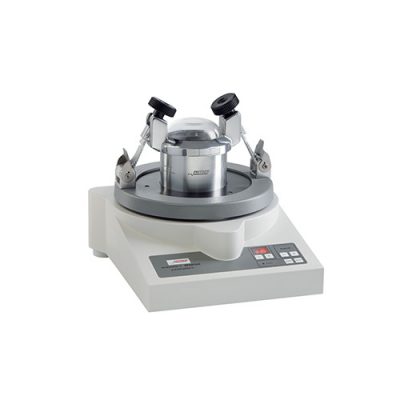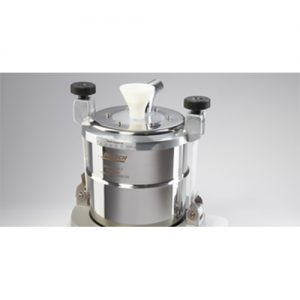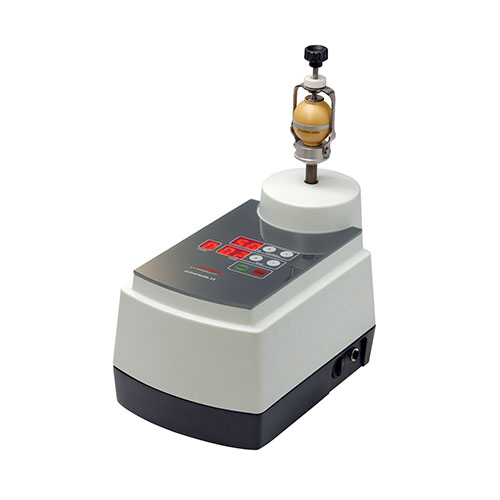Vibratory Micro Mill Pulverisette 0
The Vibratory Micro Mill PULVERISETTE 0 is the ideal laboratory mill for fine comminution of medium-hard, brittle, moist or temperature-sensitive samples – dry or in suspension – as well as for homogenising of emulsions and pastes. The FRITSCH Vibratory Micro Mill PULVERISETTE 0 is recommended for sample preparation of RoHS tests (Restriction of Hazardous Substances).
The FRITSCH Vibratory Micro Mill PULVERISETTE 0 grinds your sample through impact and friction by which the mortar vibrates electromagnetically and the grinding material transfers the vibrations to the grinding ball. At the beginning of the grinding, the comminution of the coarse particles is achieved by the impact effect of the grinding ball. Next, the fine particles are comminuted through friction by the tumbling motion of the grinding ball as the vibrations subside. The impact energy of the grinding ball is freely adjustable thus, allowing it to be precisely adapted to the sample being ground.

Vibratory Micro Mill Pulverisette 0
Features
- Adjustable oscillation amplitude for easy adaption of the vibration energy to the grinding sample
- Grinding bowl oscillations 3,000 – 3,600 oscillations/min at 1 – 3 mm amplitude
- Agglomeration phenomena avoided
- Ergonomically positioned membrane keyboard IP65, splash-proofed
- Window for observing the grinding progress
- Digital Timer
- Extensive accessories for simplifying your daily work
specifications
| Working principle | impact force |
|---|---|
| Optimal for material type | medium-hard, brittle, temperature-sensitive, moist |
| Grinding tools | mortar and grinding ball |
| Materials of the grinding tools | Agate, sintered corundum, zirconium oxide, stainless steel, hardened steel, hardmetal tungsten carbide |
| Grinding ball diameter | 50 – 70 mm |
| Max. feed size (depends on material) | 5 mm |
| Min. sample quantity | 1 ml |
| Max. sample quantity | 10 ml |
| Final fineness (depends on material) | 10 µm |
| Grinding time (depends on material) | 10 min |
| Grinding process | wet /dry |
| Grinding in inert gas | yes |
| Cryogenic grinding | yes |
| Rotational speed of main disk | 50 – 400 rpm |
| Grinding bowl oscillations per minute | 3,000 – 3,600 at 1-3 mm amplitude |
| Electrical Details | 100-240 V/1~, 50-60 Hz, 50 Watt |
| Emission sound pressure level at the workplace according to DIN EN ISO 3746 (depending on the material to be ground and mortar/grinding balls used) | approx. LpAd = 68 dB, with sound absorption hood approx.LpAd = 53 dB |
| Weight | 21 kg |
| Dimensions (W x D x H) | Bench top instrument 37 x 40 x 20 cm |
Manufacturers
show DATA — DO NOT CHANGE ID–
Industries
show DATA — DO NOT CHANGE ID–
Methods
show DATA — DO NOT CHANGE ID–
Spares and accessories for PULVERISETTE 0
GRINDING BALLS
For achieving best grinding results grinding balls are available in 50 – 70 mm diameters and in 6 different materials. For cryogenic grinding, please use mortars and grinding balls made of steel or tungsten carbide. To perfectly match your sample material to the mortar and grinding ball please refer to the material data found in the selection aid.
MORTARS
Please select 1 mortar which is offered in 6 different materials in order to optimally adapt the grinding to any sample type. For cryogenic grinding, please use mortars and grinding balls made of steel or tungsten carbide. To perfectly match your sample material to the mortar and grinding ball please refer to the material data found in the selection aid.
SPECIAL ACCESSORIES
The Gas Pressure and Temperature Measuring System – GTM for continuous measurement of gas pressure and temperature directly in the grinding bowl turns the Planetary Mills PULVERISETTE 4, PULVERISETTE 5, PULVERISETTE 6 of the FRITSCH classic line into an analytical measuring system.
For quickly and safely grinding in inert gas and for mechanical alloying classic line gassing lids are recommended.
Certificate for IQ/OQ documentation is also available.




